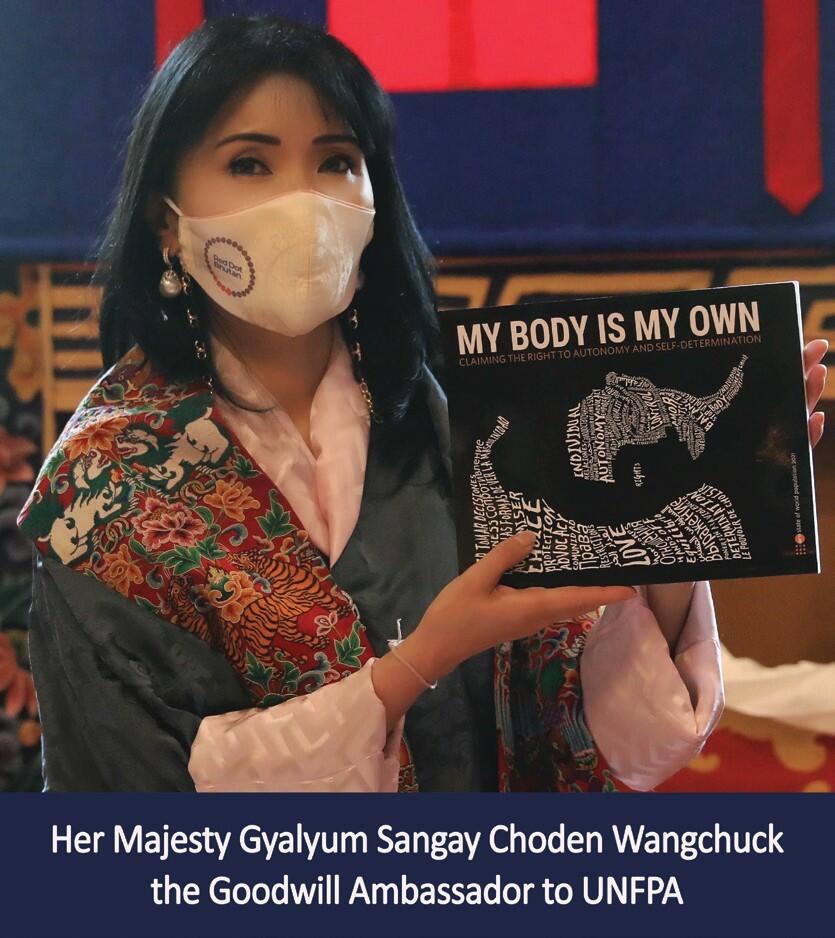11 MAY 2021, Thimphu: Her Majesty Gyalyum Sangay Choden Wangchuck, the Goodwill Ambassador to UNFPA, launched the State of World Population report 2021 titled ‘My Body is My Own- Claiming the Right to Autonomy and Self-determination’
The report states that globally nearly half of all women are denied their bodily autonomy with violations including rape, forced sterilization, virginity texting, female genital mutilation and many more.
Nearly half of women in 57 developing countries are denied the right to decide whether to have sex with their partners, use contraception or seek health care.
For the first time, a United Nations report focuses on bodily autonomy. The term ‘bodily autonomy’ is the power to make choices about one’s body without fear of violence or having someone else decide for you. According to the report, this lack of bodily autonomy has massive implications beyond the profound harm to individual women and girls: potentially depressing economic productivity, undercutting skills, and resulting in extra costs to health care and judicial systems.
Through the key findings of the report, UNFPA is measuring women’s power to make their own decisions about their bodies and the extent to which countries’ laws support or interfere with a woman’s right to make these decisions. Data from the report show a strong link between decision-making power and higher levels of education.
The report shows that in countries where data are available:
- Only 55% of women are fully empowered to make choices over health care, contraception and the ability to say yes or no to sex.
- Only 71% of countries guarantee access to overall maternity care.
- Only 75% of countries legally ensure full, equal access to contraception.
- Only about 80% of countries have laws supporting sexual health and well- being.
- Only about 56% of countries have laws and policies supporting comprehensive sexuality education.
The report also highlights the many other ways that the bodily autonomy of women, men, girls and boys are violated, some of which are as follows:
- Twenty countries or territories have “marry-your-rapist” laws, where a man can escape criminal prosecution if he marries the woman or girl he has raped.
- Forty-three countries have no legislation addressing the issue of marital rape (rape by a spouse).
- More than 30 countries restrict women’s right to move around outside the home.
Girls and boys with disabilities are nearly three times more likely to be subjected to sexual violence, with girls at the greatest risk.
Meanwhile, while there are many problems faced by women, the report also highlights solutions giving women the power to say yes, the right to say no. Efforts to address abuses can lead to further violations of bodily autonomy. For example, to prosecute a case of rape, a criminal justice system might require a survivor to undergo an invasive so-called virginity test. Real solutions must take into account the needs and experiences of those affected. In Bhutan, women and girls are more empowered to take a stance to say no to violence.
Increasingly the space to discuss sexual and reproductive health also has widened. In 2020, the Parliament amended the section 213 and 214 of the penal code that criminalized unnatural sex widely interpreted as homosexuality, a step towards empowering LGBTIQ community.
The State of World Population report is UNFPA’s annual flagship publication. Published yearly since 1978, it shines a light on emerging issues in the field of sexual and reproductive health and rights, bringing them into the mainstream and exploring the challenges and opportunities they present for international development. You can access the UNFPA State of World Population report, My body is my own: Claiming the right to autonomy and self- determination at https://www.unfpa.org/sites/default/files/pub-pdf/SoWP2021_Report_-_EN_…
As a prelude to the launch of State of World Population Report 2021 in Bhutan, RENEW and UNFPA partnered in a conversation with young people from the RTC college. The session touched on bodily autonomy-the power and agency to make choices over one’s body and future, without violence or coercion. RENEW encouraged students of RTC to participate in essay competition surrounding the above theme. Attractive five prizes will be awarded to winners.
Her Majesty Gyalyum Sangay Choden Wanghuck, UNFPA Goodwill Ambassador and the recipient of the 2020 UN Population Award at the 54th session of the CPD pointed out the challenges that still remain, with too many women and girls around the world with far too little control over their reproductive health and choices. She called on the Commission to “move beyond counting, quantification, and assessment” into “bold and courageous initiatives to inspire innovative actions to promote women’s rights” and to create a world in which “women’s equality is guaranteed, not granted”.


